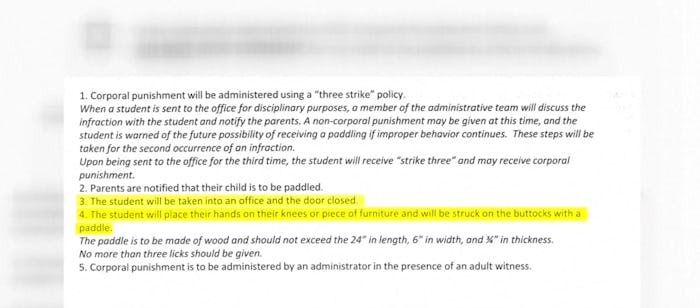News
This Georgia School Is Trying To Reinstate Paddling — & Some Parents Are Into It
When most people think of corporal punishment in schools, they probably think back to the days of their parents or grandparents. More often than not, the older generations will have stories of themselves or their classmates getting paddled, or smacked with a ruler by teachers or school administrators. "Back in the day," they'll start their tales of physical punishment at the hands of an adult educator. Unfortunately, corporal punishment in schools isn't limited to "back in the day" — because it's still alive and well now. In fact, this Georgia school wants to reinstate paddling as a punishment, and it's seriously messed up.
A school in Hephzibah, Georgia, has sent consent forms home to parents informing them of a new policy that implements paddling as a potential punishment for students, CBS News reported. (Yes, for real.) This is currently going down at the Georgia School of Innovation and the Classics (GSIC,) which is a K-9 charter school. Superintendent Jody Boulineau told WRDW-TV that roughly 100 parents had returned consent forms so far — and one-third of them gave the school permission to paddle their child as punishment. "In this school, we take discipline very seriously," Boulineau told WRDW. "There was a time where corporal punishment was kind of the norm in school and you didn't have the problems that you have."
According to Time, per the form that was sent home, the procedure for paddling students — which happens after their third offense — is as follows:
A student will be taken into an office behind closed doors. The student will place their hands on their knees or piece of furniture and will be struck on the buttocks with a paddle
Additionally, the form reads, "no more than three licks should be given."
It's worth noting there's a catch for students whose parents do not give permission for paddling, according to Time. Although parents have the choice of opting out of paddling, it requires them to agree to a five-day suspension policy in lieu of the corporal punishment.
Excuse me while I pick up my jaw from the floor. Uh, someone please tell me again what year it is? How is it 2018, and this is even an option anywhere in the U.S.? (And how in the heck did more than 30 consent forms come back already from parents who were okay with this?) Granted, two-thirds of parents did not give permission to the school to paddle their children. But still!
Thankfully, I'm not the only who who is horrified by the thought of paddling in schools. One Twitter user wrote, "I’m sorry, but this is plain wrong. No child or person should be punished physically for wrong doing period. It’s a trauma against a little body, a crossing of personal boundaries, and breaks their little spirits. Emotional and social consequences are endless for their future self."
Another Twitter user commented, "Disgusting. Physical violence against children is always wrong."
Yet another user took a jab at the school's physical appearance, "Very modern architecture for a place using medieval tactics."
Unfortunately, this isn't the only school where corporal punishment is permitted — not by a long shot. I'm sure you're probably dying to know: Is corporal punishment still allowed in my state? Here are the states that currently allow it — meaning they don't specifically ban it — according to The Atlantic: Wyoming, Colorado, Arizona, Kansas, Idaho, Indiana, North Carolina, South Carolina, New Mexico, Florida, Kentucky, Missouri, Texas, Georgia, Tennessee, Louisiana, Oklahoma, Alabama, Arkansas, Mississippi. So yeah. We've still got a long way to go.
Donald E. Greydanus — a pediatrician who has studied and written about corporal punishment for decades — testified at a congressional hearing in April, 2010, about how this form of punishment affects academic success. According to Greydanus, physical discipline makes the school environment “unproductive, nullifying, and punitive,” and teaches children that “violence is acceptable, especially against the weak, the defenseless, and the subordinate," The Atlantic reported. He added that studies show these effects are wide-ranging and long-lasting.
The American Psychological Association (APA) seems to back up the idea that physical punishment can lead to lasting harm. According to a 2012 article, "many studies have shown that physical punishment — including spanking, hitting and other means of causing pain — can lead to increased aggression, antisocial behavior, physical injury and mental health problems for children."
With all of this in mind, it just doesn't make sense for any school to use corporal punishment on students. Yet, here we are — condoning child abuse in schools. It makes me sick. And I think most people would agree that banning all types of physical punishment from all schools in the U.S. is long overdue.
